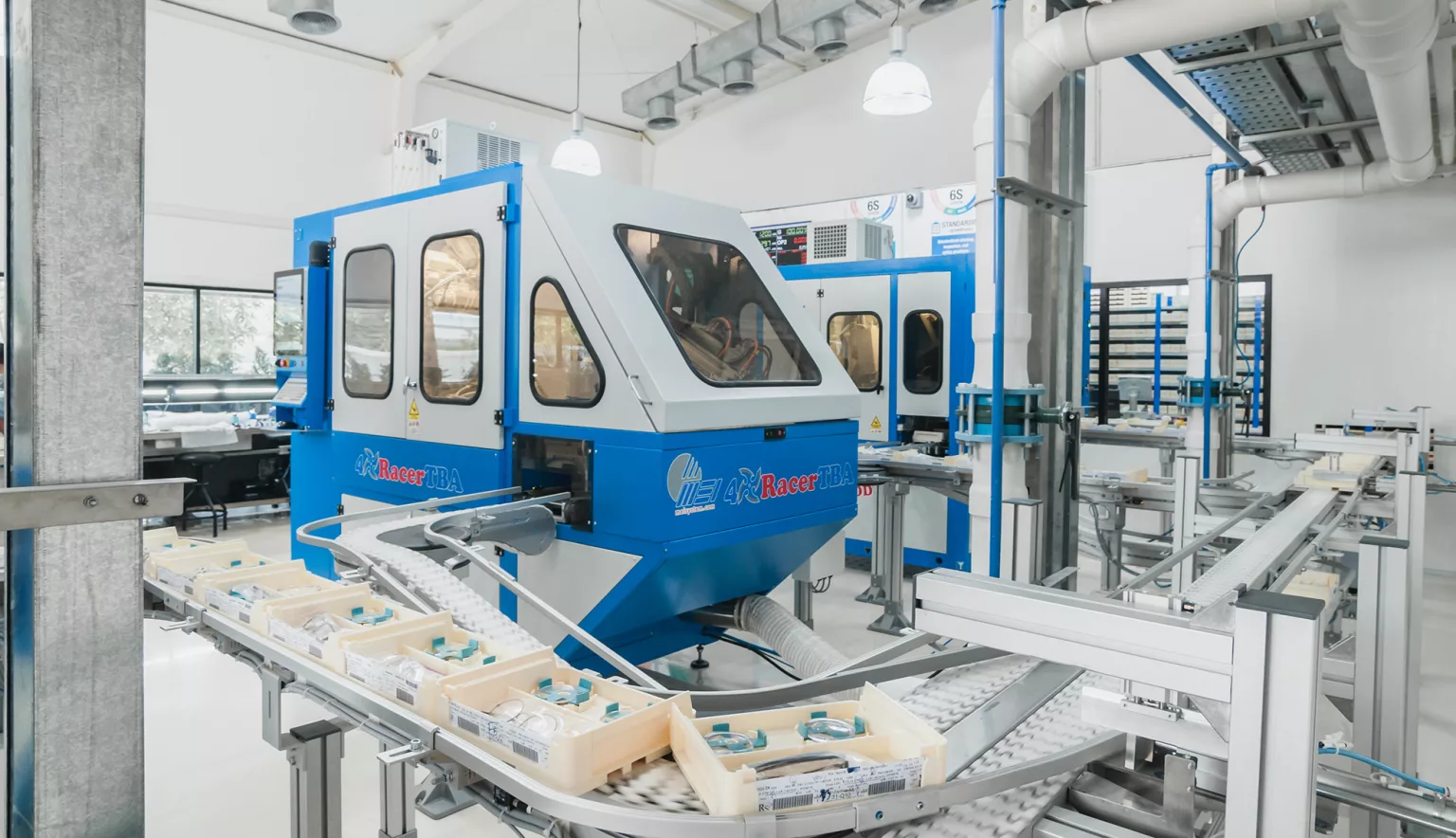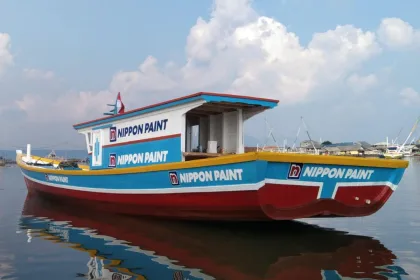CLEAR VISION, CARING CULTURE
WORKING TOGETHER
In its current incarnation, TOG manufactures and distributes ophthalmic mineral lenses, Rx lenses, plastic lenses and photochromatic lenses, which it sells to shops in Thailand and across the world.
“We offer high quality optical lenses made of plastic and engineered through different processes, resulting in different characteristics,” explains Pracharktam.
“We start from the liquid polymer mode and solidify them into lenses. When we get the lenses we have two options; one is a finished lens which has a certain prescription, which we can sell to our customers, whereas the second is where we shape the back to create a prescription tailored to the individual.”
The CEO believes it is this capability with chemistry that enables the company to stand out from competitors. It can convert many difficult formulae into optical lenses, resulting in unique characteristics, such as impact resistance.
But above all, he believes that TOG’s hospitable attitude is what stands it apart.
“The second thing is that our company is enriched by the Thai culture – we are friends with everyone,” he laughs. “This industry is governed by a couple of very large conglomerates, meaning there is not much freedom to choose products.
“We are the so-called alternative to these companies; we have service engrained into our culture and trying to help everyone. This is our uniqueness – anyone can come and work with us as a partner. We have the technology and capability to perform services for them.”
For example, TOG does a lot of work with startups. They often come to the table with an idea, and are looking for someone to produce a sample for them, alongside expert technical knowledge and advice, both of which TOG is happy to provide.
“Many large companies refuse to work with startups but we are small enough that we listen to everyone that comes to us with an idea, and then we help them make their sample,” Pracharktam says.
“Right now in the industry there is a lot of work on virtual reality. If you look on the news you see Facebook and Apple and it’s all about virtual eyeglasses – even Google just bought North, which provides smart glasses.”
These glasses provide information in a hands-free format for users. Google Glass contains features such as an in-built camera, an LED display and voice-activation commands. The application has been used, among other things, for medical procedures – Dr Christopher Kaeding used it to converse with a colleague during a complex operation, which students were able to watch on their laptops.
But much of the work going on around smart glasses is very much in the experimental stage.
“We were talking to some company – who are already bankrupt – with a crazy idea of glasses with a camera or infrared detector which captures an image of the person you’re talking to and sends it to a database to assess whether or not they are a criminal,” the CEO says, with some amusement.
Jokes aside, TOG does take approaches from startups seriously, and uses its manufacturing and technology expertise to ascertain whether or not these ideas can become a reality.
The company has also forged close relationships with its partners and suppliers, which the CEO believes are crucial in this line of work.
“For example, our chemical manufacturer PPG don’t know how to convert to the final products. They have to turn to someone to really understand the drawbacks and disadvantages of certain formulae,” he explains.
TOG works closely with each partner, supplier and customer on an individual places, so it can understand their specific needs and wants. To do so ensures minimum errors and maximum efficiency, and Pracharktam believes that maintaining transparency throughout the process is of paramount importance.
“We are open to our customers to the level of every detail they need to know to improve their business or efficiency,” he says.
DIGITISATION AND PROGRESSION
Good relationships in business have never been more important than they were this year during the COVID-19 pandemic, which not only destroyed lives but disrupted supply chains.
During Thailand’s lockdown, the company was able to stay operational, albeit in a limited capacity. This is because it has its own dormitory – operators could therefore quarantine, working in the factory and sleeping in the dormitory, having no contact with outsiders. Vendors provided food and TOG ensured effective safety measures in the factory, such as body temperature checks before entering the building and an isolation unit. While some workers elected to return home to their families, many decided to stay at the factory.
“We built a small community,” Pracharktam says. “Production stayed open, and the operators were happy because it meant they were able to continue making money. We also had to make sure we weren’t just producing if there were no buyers, so we had to work very closely with our customers to work out exactly what they needed and thereby optimise our resources.”
TOG also helped out the community around the factory. As a chemical-based company it was able to start making hand gel, which it gave to its workers and the local community, including the nearby nursing home. It also talked to local community leaders to see if there was anyone who needed anything provided to survive the pandemic.
With new daily cases now in the single digits in Thailand, TOG has set its sights on recovery.
“We are working closely with customers because right now it is difficult to make even a medium term plan of say, three years, because the situation is not very secure,” the CEO says. “If COVID reoccurs lockdown could happen – this is one key aspect of our plan; we need to be nimble, adjustable. If there’s a boom people will want more expensive products, but if there is a crash they will want cheaper products, so within our process there needs to be multiple skills.”
TOG plans to establish a distribution centre in Europe, to be closer to its overseas customers. This means they can order lenses as and when they need, instead of ordering in bulk and risking potential disruption to the supply chain. This model is lower risk and the CEO believes it will be popular with clients, especially in such a difficult period.
It is also investing into automation, as it is currently the safest way to continue manufacturing.
Another key strategic pillar for TOG over the upcoming months is digitisation – connectivity is particularly important for a company which has 95 percent of its customers located overseas.
“I grew up with the fax and the telegram and right now the amount of information that can be provided online is tremendous,” Pracharktam says. “For example, if you are having an eye test in the UK, the shop can send us information of your details, your prescription and the frame you choose, such as the shape, then we can optimise it in the machine to create the perfect lenses for your requirements, and we send it back.
“The world is moving towards an increasing reliance on artificial intelligence, and because of this we need big data packages.”
The team at TOG has integrated digitisation into its strategy in order to connect with its customers, and provide the most optimised and efficient services that it can for them. The company relies on Thai engineers and suppliers to take the company forward into the future.
“We share technology with our suppliers but it’s not a model where suppliers come with foreign investment and their own engineers – we have good people here, and we are proud of operating this way,” the CEO concludes.





























